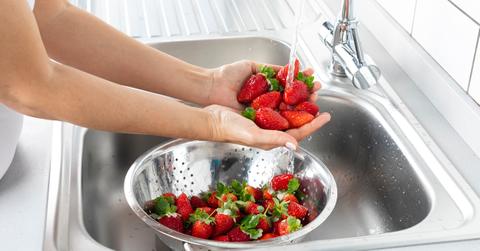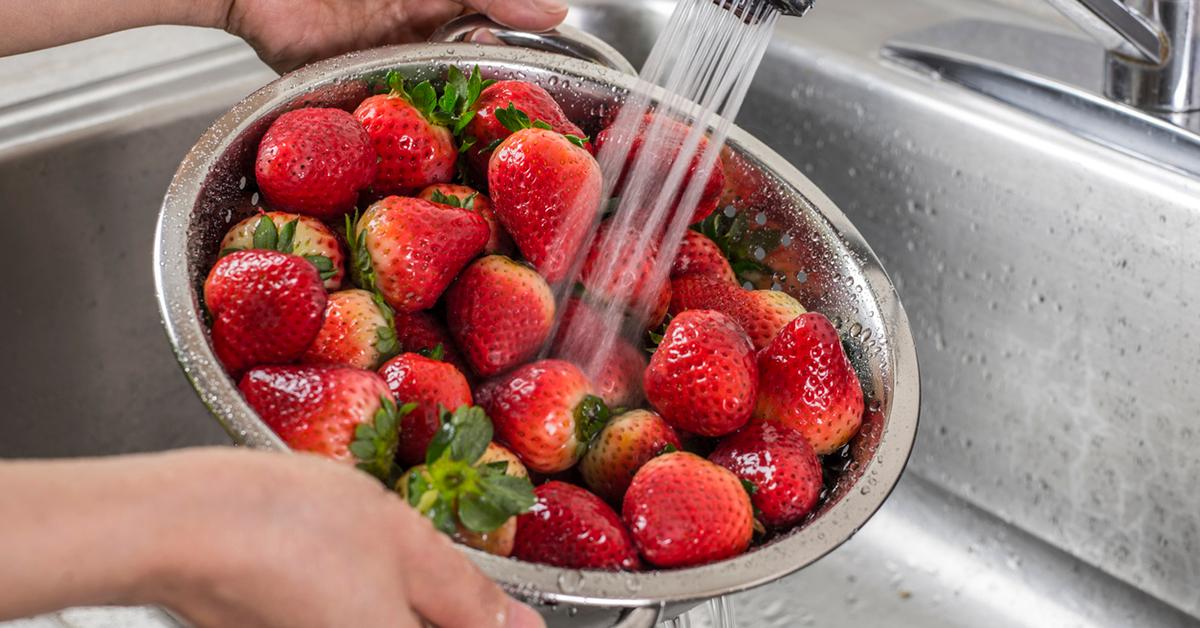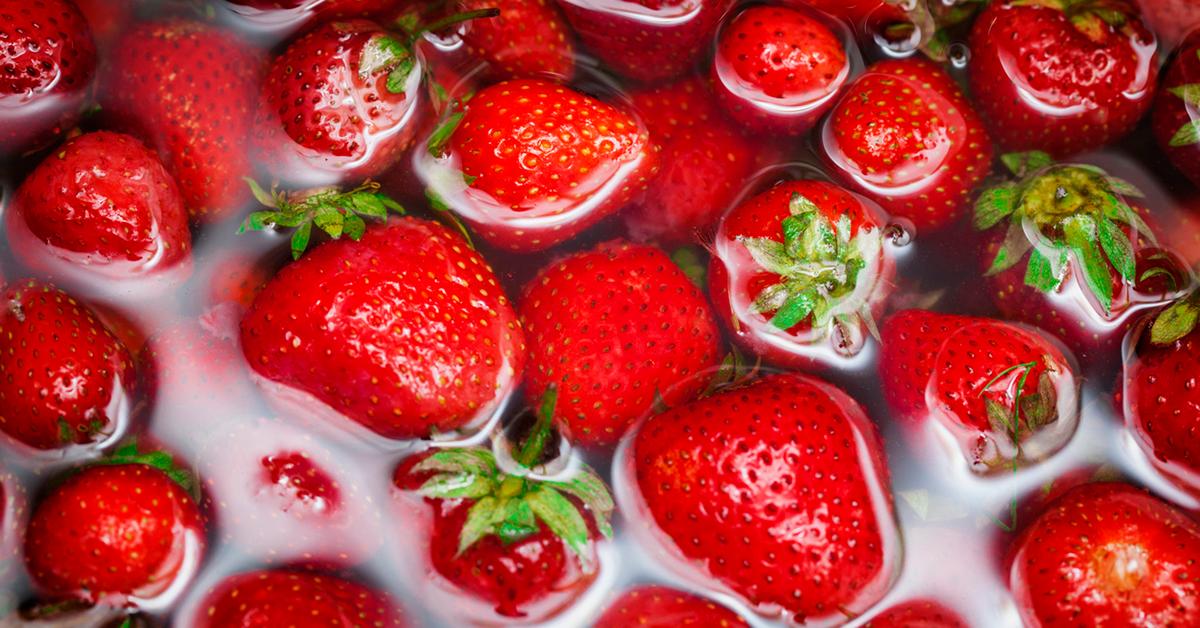How to (Properly) Wash Strawberries
There’s a reason why strawberries top the dirty dozen list every year!
Updated June 1 2020, 3:21 p.m. ET

Strawberry lovers, one of the hardest pills we will ever have to swallow is accepting that strawberries habitually take home the No. 1 spot on the annual Dirty Dozen food list. (If you’re new to the Dirty Dozen, it’s an annual list of the top 12 crops that contain the highest amounts of pesticide residue.) Like clockwork, strawberries almost always appear in the No. 1 slot each year.
Now that’s not to say that we should all forego eating strawberries. After all, strawberries contain a lot of nutritional value as they are high in Vitamin C, folate (B9), manganese, and potassium. According to Healthline, strawberries are also high in antioxidants that contribute to overall heart health.
So, even though strawberries may make the top of the Dirty Dozen list on the regular, it’s important we continue eating them. In order to make sure you’re enjoying your strawberries pesticide-free, you can buy organic strawberries and also take care to properly wash your strawberries before eating them — after all, you’ve probably already seen those viral videos of people soaking strawberries in saltwater only to be greeted by some unexpected visitors… Don’t let that be you!
Keep reading for information on how to properly wash strawberries!
Are you supposed to wash strawberries?
Being that strawberries are one of the highest offenders in pesticide residue, you should always wash strawberries before eating them. It helps to buy organic strawberries, but still, you will probably want to wash them first.
An annual report by the Environmental Working Group (EWG) found that strawberries have the highest levels of pesticide contamination amongst produce. According to Medicine Net, the report tested 36,000 samples of 48 types of “conventionally grown” strawberries. The findings showed nearly 70 percent of strawberries to contain pesticide residues — and at least 20 different pesticides at that. Strawberries have the highest pesticide numbers because of a farming process called fumigation, which destroys nearly everything in the soil in which the strawberries are planted.
So, does a washing do the trick? It does. According to the Centre for Science and Environment (CSE), a cold water washing removes anywhere from 75 to 80 percent of pesticide residues from produce.
Can you wash strawberries with dish soap?
The Food and Drug Administration (FDA) does not recommend washing fruits and vegetables with soap, detergent, or even a commercial produce wash specifically designed to wash produce, according to Food Network. It’s a recommendation that the Centers for Disease Control and Prevention (CDC) is also on board with.
Both the FDA and CDC dissuade people from washing fruits and vegetables with soaps, detergent, and commercial produce washes because these products can leave behind residues. While they may wash off any pesticide residues, you will also likely be getting a mouthful of the soap or detergent itself. Since the FDA has not evaluated the safety of ingesting such soapy residues, it recommends against using them to clean strawberries and other fruits and veggies.
How to properly clean strawberries:

Strawberries should only be washed if you are going to eat them immediately. Do not wash strawberries in advance, as the added moisture will cause the strawberries to go bad faster.
To properly wash and clean strawberries, place the strawberries you intend to eat in a colander and run it under cold, running water. You can do this for anywhere from 10-20 seconds, but make sure that every single strawberry has been thoroughly rinsed. Pat the strawberries dry with a towel, then eat.
Strawberries can also properly be cleaned with a vinegar or salt wash. To clean strawberries with vinegar, fill a bowl with 1 cup white vinegar, 8 cups of water. You should let the strawberries sit in the vinegar-water bath for at least five minutes before draining the bath and drying the strawberries with a towel. In addition to clearing the skin of the strawberries of pesticides, white vinegar can also help eradicate any excess grime, dirt, or bacteria they may be on the surface.
To clean strawberries with a salt bath, make a 1:1 mixture of salt and water. For every cup of warm water in the bowl, add 1 teaspoon of salt. Let the mixture cool prior to adding in the strawberries, then add them in and let them soak for at least five minutes. Rinse the strawberries under cool, running water, then pat them dry with a towel.
Alternatively, you could go by the Mashed recipe and combine one part white vinegar, four parts cold water, and at least 10 percent salt in a bowl.
Can you wash strawberries with vinegar?
A vinegar bath can wash away any potential pesticide residue that may be lingering on your strawberries. To make a vinegar-water bath, combine 1 cup of white vinegar with 8 cups of water. The berries should soak in this bath for at least five minutes before you rinse them with cold, running water.
Can you wash strawberries with apple cider vinegar?
While white vinegar is generally the vinegar of choice recommended for washing strawberries, according to Don’t Waste the Crumbs, you can wash strawberries with apple cider vinegar. In fact, an apple cider vinegar wash may just keep some fruits and veggies fresher for longer.
How to wash strawberries with salt:

According to a recent TikTok trend, people have been washing strawberries in a salt bath to find out whether bugs live inside the berries. (#StrawberriesWithBugs for your reference.) And no, it’s not some TikTok trend founded on shaky ground. According to Nutrition Facts, when you soak strawberries in a solution of at least 10 percent salt water — Mashed recommends a bowl of one part white vinegar, four parts cold water, and at least 10 percent salt — it ejects the offspring of fruit flies often laid inside and on the surface of crops. After about five minutes of letting the strawberries sit in the salt wash, you will start to notice little worms seeping out of the strawberries.
These are the offspring of the Spotted Wing Drosophilia (SWD), a type of fruit fly that lays its eggs inside fresh fruit before they harvest, unlike most other fruit flies that only lay in overripe fruits.
Horrifying, yes — but a salt bath is well worth it if you don’t want to eat berry bugs.
Can you wash strawberries ahead of time?
Washing strawberries ahead of time — meaning well before you plan to eat them — is not generally recommended. Moisture isn’t good for strawberries, as the presence of moisture encourages the faster growth of mold. The quicker mold grows, the quicker the strawberries will go bad. Instead, wash your strawberries a few minutes prior to eating them.